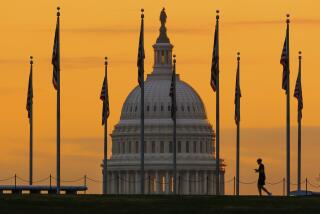The American paradox: Schools stink, but only from a distance
- Share via
According to the most recent Phi Delta Kappa/Gallup poll on education, Americans are split over a lot of things about schools -- whether teachers should be evaluated in part on standardized test scores and the degree to which that should happen, whether private-school vouchers are a good idea, whether the children of illegal immigrants should be entitled to a free public education.
One thing that Americans have been fairly consistent about in polls for many years, though, is that overall, they don’t think very highly of public schools. Except the ones their children attend. The same sentiments held true this year -- but more so.
Asked to grade the nation’s schools, only 19% were willing to confer an A or B. They were more positive, but evenly split, about the schools in their communities -- 48% would give those schools an A or B, and an equal number would give them a lower grade. But when parents were asked to rate their oldest child’s school, 77% went for an A or B.
Further, respondents were somewhat more negative about the nation’s schools than in previous polls -- and at the same time far more positive about their own schools. Five years ago, 67% of parents were willing to give their oldest child’s school an A or B; that’s gone up by 10 percentage points.
What does all this mean? Depending on their school politics, analysts are putting decidedly different spins on the figures. Author and education expert Diane Ravitch, once a gung-ho reformer who then turned into an equally gung-ho anti-reformer, says it shows that media reports repeatedly quoting the likes of Bill Gates have made the public believe a canard about “failing” public schools, while those who are actually up close to schools see the reality.
That might well be true. It’s easy to criticize low test scores from afar; parents see how much their children are learning. Their information is fresher as well. But there are other possibilities.
For one thing, the groups are slightly different. All respondents were asked about their nation’s schools and those in their community. Only parents, obviously, could be asked about their children’s individual schools. There likely are some inherent differences between the attitudes of older people, who would have no children in the schools, and younger ones. In addition, parents want to feel they’re doing the best possible thing for their children, including making good educational choices for them. They have a vested interest in believing the schools their children attend are high-quality.
It’s also conceivable that the numbers simply reflect reality. Twenty-three percent of parents gave their child’s school a mediocre to failing grade; these might be the parents whose children attend the worst schools (though not necessarily; sometimes parents in affluent areas simply have higher expectations of their schools). And if those opinions reflect reality, that means a fifth or more of schools appear to be letting students down. People might believe in their local schools, but they also might agree that the number of low-performing schools is too high for the nation to earn a good grade overall.
It’s hard to know; parental perceptions aren’t always in keeping with reality (nor, necessarily, are public perceptions). In the polling of parents, 91% were certain their school-age children would earn a high-school diploma, and when you add the number who agreed strongly but not at the top level, the number rises to 96%. Recent figures show that the nation’s graduation rate has climbed to: 73%.
There was some bad news in the poll for reformers who have tried to paint a picture of school failure brought about by incompetent or uncaring teachers. Americans think very highly of teachers. And what they really think is the biggest problem with schools is lack of adequate funding. In fact, about two-thirds say they would be willing to pay more taxes to improve urban schools and close the achievement gap. Again it’s time for a reality check. Schools don’t see much of that kind of support among voters.
Something we probably all knew without a poll: It’s a lot easier to favor higher taxes in theory than in reality.
ALSO:
Circumcision wars: The other side weighs in
More to Read
A cure for the common opinion
Get thought-provoking perspectives with our weekly newsletter.
You may occasionally receive promotional content from the Los Angeles Times.










